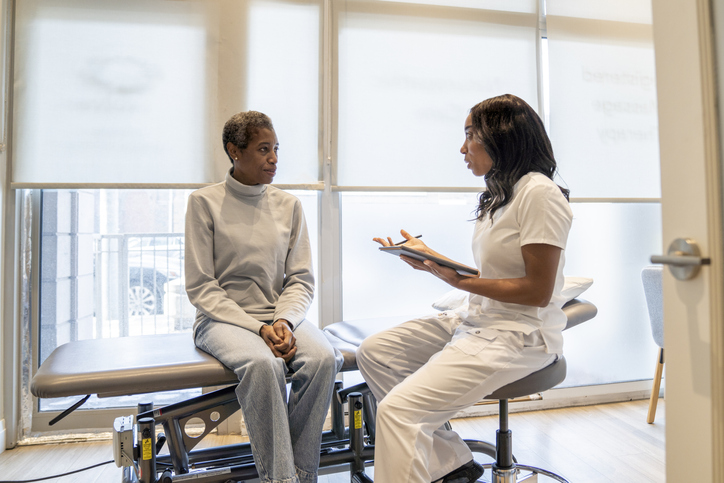
Source: FatCamera / Getty
There is much more to hormonal changes for women than many may even consider. While it’s commonly known that you’ll begin and end a menstrual cycle, not much is discussed aboutl the in-between bodily changes women as young as age 20 may experience. MADAMENOIRE sat down with Dr. Veronica Gillispie-Bell, a board-certified obstetrician, gynecologist and associate professor in New Orleans, to discuss how women’s hormones shift throughout the age groups and ways to naturally supplement during the variety of transitions she will experience.
Women start ovulating as soon as puberty.
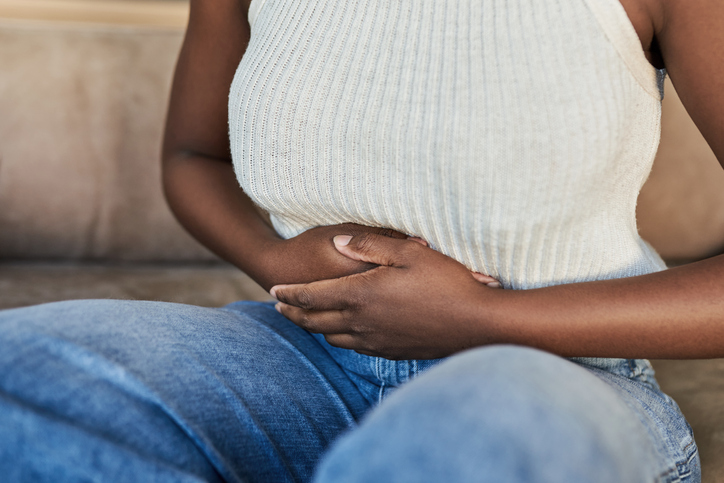
LaylaBird
Women are born with all the eggs they will ever carry, and they begin to start ovulating them as soon as puberty. This means the hormonal aging process starts immediately.
“When you talk about age, and you’re talking about hormones, it is related to your ovaries and your eggs because that really is the source of that, ” Gillispie-Bell said. “And so when we get into our 20s, depending on when we had our first cycle, it takes a little time for the hypothalamic-pituitary access to regulate itself and start having regular ovulation and cycles.”
This is the time in the hormonal cycle when estrogen levels are the highest.
“And so things like our sex drive is much higher than it’s gonna be in our 40s because those hormones are much higher, but again, starting to become more regular,” Gillispie-Bell said.
Your 20s is when you should begin osteoporosis preventative care.
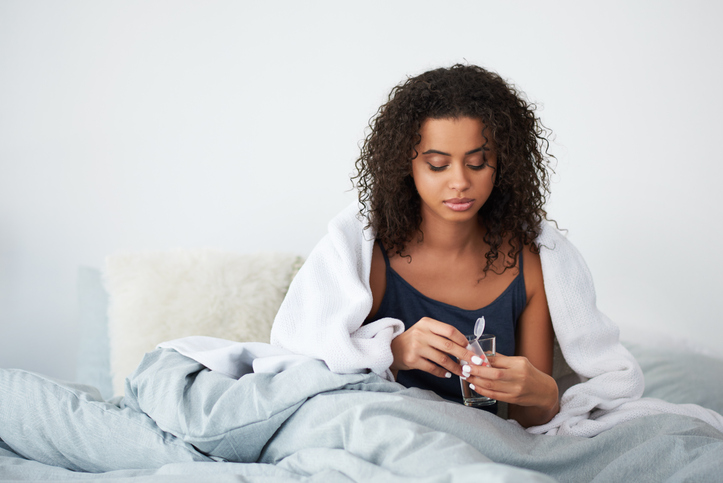
PeopleImages
While everything is starting to regulate and women in their 20s may feel too young to consider things that may affect them later in life, Gillispie-Bell suggests this is the decade to begin taking vitamin D3 and calcium and become concerned about bone health.
“For Black women, the rate of osteoporosis is a bit lower, but it’s not zero,” she said. “And so we want to protect our bones, our skin, like all those things starting in our 20s. It’s long-term prevention for osteoporosis.”
Osteoporosis leaves bodies at risk for bone injury even from low-impact accidents.
When choosing supplements, you should look for 800 IU of vitamin D3 and about 1200 milligrams of calcium.
“We know that Black women have lower levels of vitamin D, and studies have shown that is the one thing you can do to prevent the recurrence of fibroids,” Gillispie-Bell said.
Women who have fibroids should still only take 800 IU of vitamin D3.
The quality of eggs starts to decline in your 30s
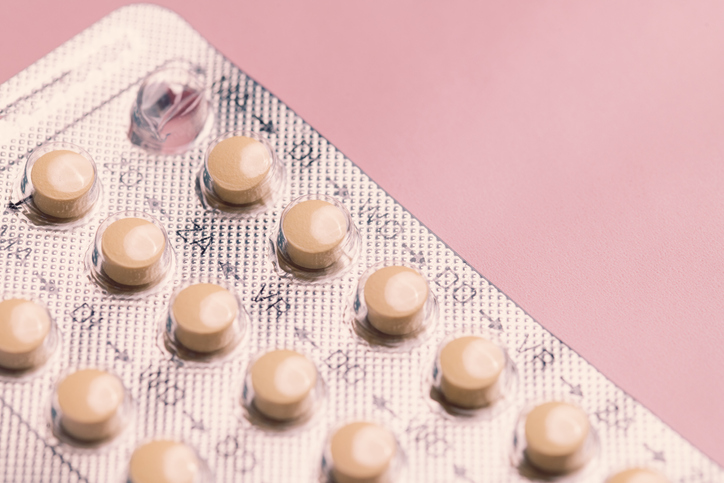
Source: Hugo Goudswaard / Getty
“Sociologically, women are waiting until later in life to have children, and biologically, our bodies have not caught up with that.”
Women start to see a decline in egg quality around age 35 and, most significantly, by age 40.
“So if you are a woman in your 30s and you’ve not had children and don’t anticipate you’re gonna have children in the early part of your 30s, you may want to freeze your eggs,” Gillispie-Bell said. “That’s something that we don’t talk about in the Black community very often – we don’t talk about it in any community, but we really don’t talk about it in the Black community. We, as providers, don’t talk about it very much, either. But we know that sociologically, women are waiting until later in life to have children, and biologically, our bodies have not caught up with that.”
One of the biggest things she said women in their 30s need to consider is mental well-being.
“We are all somewhere on the mental health spectrum, and so in your 30s, it is a lot of balancing going on,” she said. “Most women are balancing their careers. And then, if you have had children, balancing the family. And so just making sure that mentally you are well, just making sure physically you are well is so important.”
It’s also time to start incorporating magnesium into your daily regime.
“Magnesium is a great supplement for PMS,” Gillispie-Bell said. “It is a mood stabilizer. So that is one thing to consider if you’re finding that you’re having PMS or even PMDD.”
Exercise, water, essential oils and community are healing mechanisms.
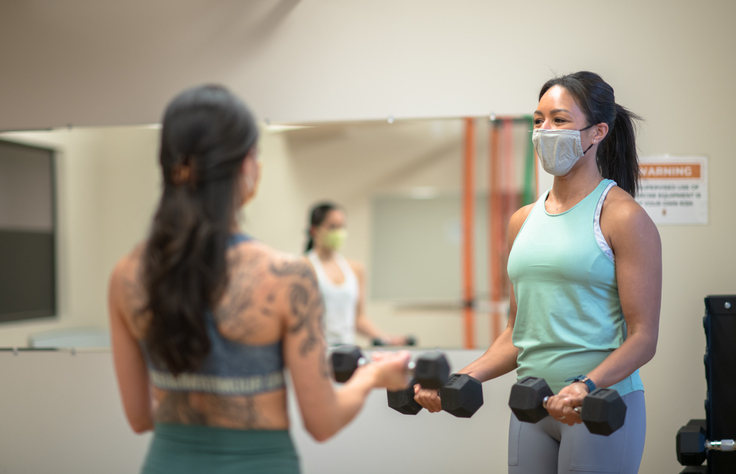
Source: FatCamera / Getty
While Gillispie-Bell said it might feel counterintuitive, exercise can relieve PMS symptoms like fatigue.
“You may like you can’t even move out the bed because you’re so tired, but exercising helps with that,” she said.
For pain management, she said women should consider fighting off sugary and salty cravings and instead increase water intake.
“The uterus is a muscle, so just like your muscles are gonna cramp, if you don’t drink enough water, your uterus is a muscle. It’s gonna cramp more if you’re dehydrated,” she said. “So you need to drink more water.”
It might be hard to imagine drinking water when you feel bloated, but Gillispie-Bell stands firmly behind the suggestion.
“When you drink more, that helps to flush those toxins through your kidney as well,” she said. “So it helps it all. And, of course, you can do a warm heating pad, a warm shower and things like that. Lavender, those kinds of natural things as well, essential oils on your wrist, things like that. But really, I think we underestimate the power of water.”
Recognizing pain can be worse for women with health issues, Gillispie-Bell said that no matter how hard it is to be in community with people when you’re in pain, it’s essential to healing.
“I can think of a ton of inflammatory conditions – any of those chronic issues and chronic situations, chronic conditions can be exacerbated during [your menstrual cycle],” she said. “You want to make sure that you’re not isolating, that you’re spending time with the people that you love, and the things that you love to do that make you feel good. If you can push through the pain and get up and do the things you like to do, it helps your overall well-being. And then that helps with the pain too.”
Estrogen levels begin to decline, and it’s time for mammograms.
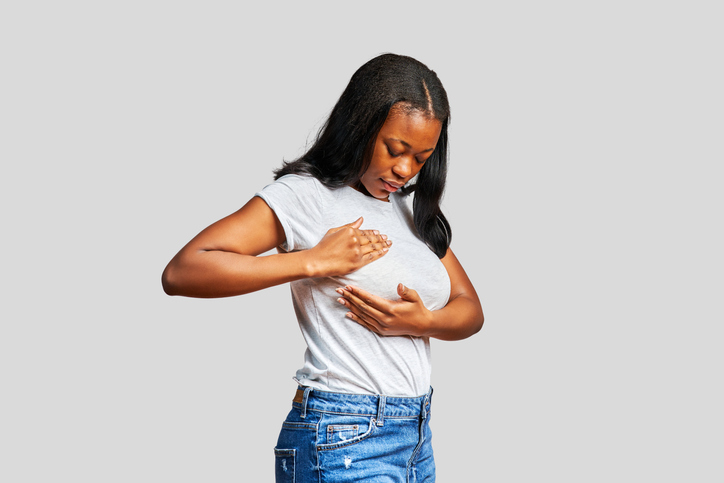
Source: Abraham Gonzalez Fernandez / Getty
“So now we’re going back to almost before puberty.”
Women in their 40s face noticeable hormonal changes like decreased sex drive, vaginal dryness and perimenopause symptoms, including hot flashes.
“Estrogen levels are starting to decline. So now we’re going back to almost before puberty,” Gillispie-Bell said. “So that means we have decreased sex drive. You can have vaginal dryness that goes along with that as well. And cycles can get lighter and start to space out.”
The average age of menopause is 52, but some women go into menopause earlier, and some go later.
“Regardless, the time before you go into menopause is called perimenopause, and in that timeframe, hormones are changing,” Gillispie-Bell said. “You then start to feel symptoms like hot flashes and night sweats.”
She encourages alternative medicine as a first option. Still, she warns that women should discuss any treatment with their doctors to ensure there will be no interactions with prescribed medications or illnesses.
“As a provider, I always start with what is least invasive,” she said. “It’s always fine to start with that, with the understanding that you may need to escalate to a prescription medication depending on the condition and the level of symptoms.”
Gillispie-Bell suggests soy and black cohosh for mild menopause symptoms. However, if your symptoms are moderate to severe the herbal supplements may not work.
“You have to be aware of that, but there are other lifestyle changes you can make,” she said. Especially if you’re having mostly night sweats, you can make sure that there’s a fan by the bed. You can get cooling sheets, cooling blankets, cooling pillows, sleep with no clothes on, you know, you can do those types of modifications.”
Paying attention to your triggers is also a great method.
“For many women, caffeine, red wine and tomato-based things can be triggers,” the doctor said. “Spicy foods can be triggers for hot flashes and night sweats.”
Vaginal dryness, a natural part of the aging process, can be triggered by soaps and other products. There are a variety of over-the-counter lubricants; however, Gillispie-Bell said there are a few natural items that can be used to remedy dryness.
“You can do coconut oil. That works very well as a lubricant,” she said. “Get it from the cooking aisle because they don’t usually do 100% coconut oil in the hair aisle. For ladies, it is to go in you, not on him. That’s the way it works to be the best.”
Other natural lubricants include vitamin E and olive oil.
“You have to be aware if you are sexually active that oil-based things can make the condom break,” Gillispie-Bell said. “So if you’re sexually active and still need to use condoms to protect against STDs and pregnancy, then you want to use a water-based lubricant.”
A very big thing for women in their 40s to consider is breast health. The recommended age to begin getting mammograms is 40, but women at every post-pubescent age should be doing monthly self-exams.
“We don’t know what causes breast cancer, so there are no prevent preventive things to do,” Gillispie-Bell said. “All we have is early detection, so for that reason, we recommend getting a mammogram once a year and starting at 40. You should also be doing self-breast exams at home. There’s been some controversy over that, because they say women find things, and it ends up being nothing. And then it costs all these healthcare dollars to evaluate. Again, I also know women who have found their own breast cancer doing their breast exams. And so we do advocate still doing yourself a breast exam.”
Overall, the body goes through a litany of changes over time, so it’s essential to understand your body, its triggers and what works best for you.
“Please do not let your quality of life suffer because your quality of life matters – You matter,” Gillispie-Bell said.
RELATED CONTENT: Erykah Badu Opens Up About Embracing Menopause: ‘Mood Swings By Badu’









